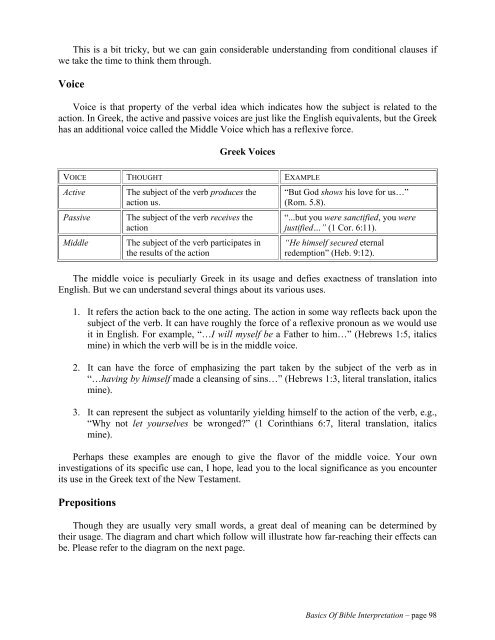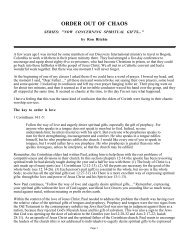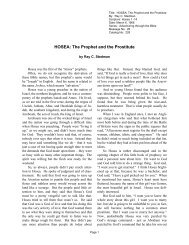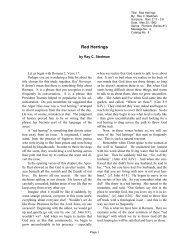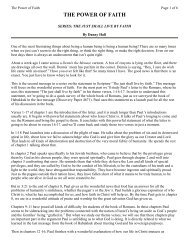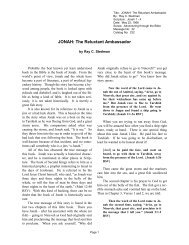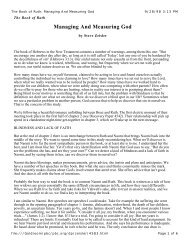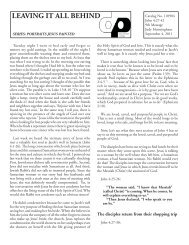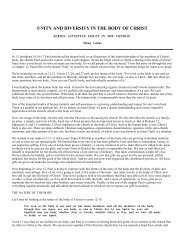Basics of Bible Interpretation - RayStedman.org
Basics of Bible Interpretation - RayStedman.org
Basics of Bible Interpretation - RayStedman.org
You also want an ePaper? Increase the reach of your titles
YUMPU automatically turns print PDFs into web optimized ePapers that Google loves.
This is a bit tricky, but we can gain considerable understanding from conditional clauses if<br />
we take the time to think them through.<br />
Voice<br />
Voice is that property <strong>of</strong> the verbal idea which indicates how the subject is related to the<br />
action. In Greek, the active and passive voices are just like the English equivalents, but the Greek<br />
has an additional voice called the Middle Voice which has a reflexive force.<br />
Greek Voices<br />
VOICE THOUGHT EXAMPLE<br />
Active<br />
Passive<br />
Middle<br />
The subject <strong>of</strong> the verb produces the<br />
action us.<br />
The subject <strong>of</strong> the verb receives the<br />
action<br />
The subject <strong>of</strong> the verb participates in<br />
the results <strong>of</strong> the action<br />
“But God shows his love for us…”<br />
(Rom. 5.8).<br />
“...but you were sanctified, you were<br />
justified…” (1 Cor. 6:11).<br />
“He himself secured eternal<br />
redemption” (Heb. 9:12).<br />
The middle voice is peculiarly Greek in its usage and defies exactness <strong>of</strong> translation into<br />
English. But we can understand several things about its various uses.<br />
1. It refers the action back to the one acting. The action in some way reflects back upon the<br />
subject <strong>of</strong> the verb. It can have roughly the force <strong>of</strong> a reflexive pronoun as we would use<br />
it in English. For example, “…I will myself be a Father to him…” (Hebrews 1:5, italics<br />
mine) in which the verb will be is in the middle voice.<br />
2. It can have the force <strong>of</strong> emphasizing the part taken by the subject <strong>of</strong> the verb as in<br />
“…having by himself made a cleansing <strong>of</strong> sins…” (Hebrews 1:3, literal translation, italics<br />
mine).<br />
3. It can represent the subject as voluntarily yielding himself to the action <strong>of</strong> the verb, e.g.,<br />
“Why not let yourselves be wronged?” (1 Corinthians 6:7, literal translation, italics<br />
mine).<br />
Perhaps these examples are enough to give the flavor <strong>of</strong> the middle voice. Your own<br />
investigations <strong>of</strong> its specific use can, I hope, lead you to the local significance as you encounter<br />
its use in the Greek text <strong>of</strong> the New Testament.<br />
Prepositions<br />
Though they are usually very small words, a great deal <strong>of</strong> meaning can be determined by<br />
their usage. The diagram and chart which follow will illustrate how far-reaching their effects can<br />
be. Please refer to the diagram on the next page.<br />
<strong>Basics</strong> Of <strong>Bible</strong> <strong>Interpretation</strong> – page 98


